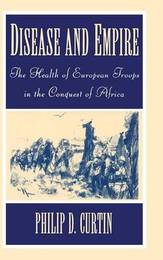
|
Disease and Empire: The Health of European Troops in the Conquest of Africa
Hardback
Main Details
| Title |
Disease and Empire: The Health of European Troops in the Conquest of Africa
|
| Authors and Contributors |
By (author) Philip D. Curtin
|
| Physical Properties |
| Format:Hardback | | Pages:290 | | Dimensions(mm): Height 229,Width 152 |
|
| Category/Genre | World history |
|---|
| ISBN/Barcode |
9780521591690
|
| Classifications | Dewey:610.96 |
|---|
| Audience | | Tertiary Education (US: College) | | Professional & Vocational | |
|---|
| Illustrations |
38 Tables, unspecified; 14 Maps; 27 Line drawings, unspecified
|
|
Publishing Details |
| Publisher |
Cambridge University Press
|
| Imprint |
Cambridge University Press
|
| Publication Date |
28 May 1998 |
| Publication Country |
United Kingdom
|
Description
From 1815 to 1914, death rates of European soldiers, serving both at home and abroad, dropped by nearly ninety percent. But this drop applied mainly to soldiers in barracks. Soldiers on campaign, especially in the tropics, continued to die from disease at rates as high as ever. This book examines the practice of military medicine during the conquest of Africa, especially in the 1880s and 1890s. Curtin examines what was done, what was not done, and the impact of doctors' successes and failures on the willingness of Europeans to embark on imperial adventures.
Reviews"Military historians and historians of Africa will not think the same way about African conquest after reading this work." Journal of Interdisciplinary History "Well researched and well argued..." Choice "...Curtin has given historians of Africa, European expansion, medical science, and the military much to ponder and pursue." Joseph P. Smaldone, Journal of Military History "...clearly and persuasively written." The International History Review "The success of the book derives from Curtin's ability to choose and analyze in depth, representative episodes that cover the scope of this tumultuous century of Europe's relationship with Africa." William H. Schneider, American Historical Review "In this slender volume we learn much about the medical side effects on Europeans of warmaking, the distribution of typhoid and malaria, the public's information about disease etiology, and the surprising role played by water in all of these." African Studies Review "The author's uncommon skills for nuanced narrative, statistical analysis, and for explaining the causes of major historical events have been employed effectively to produce an outstanding study." Toyin Falola, The Historian
|